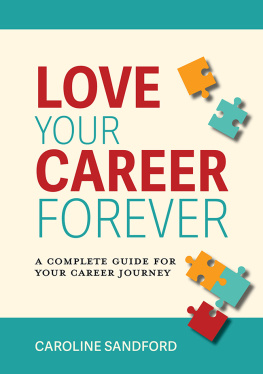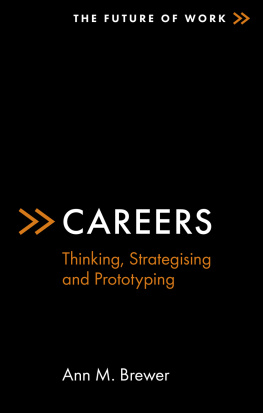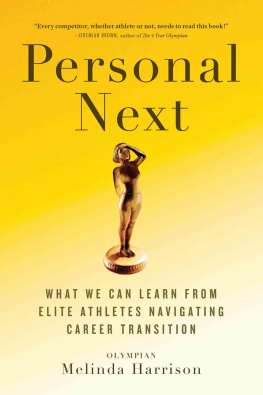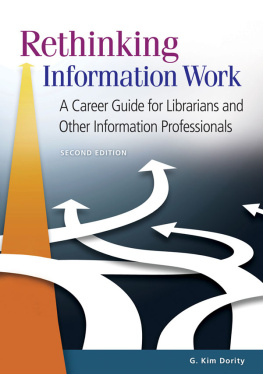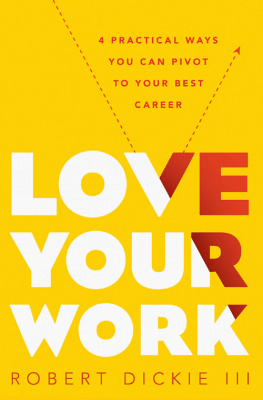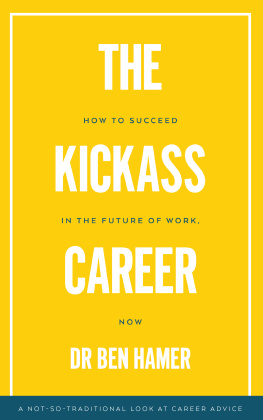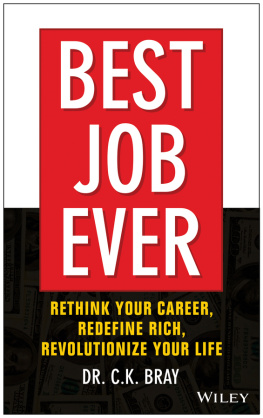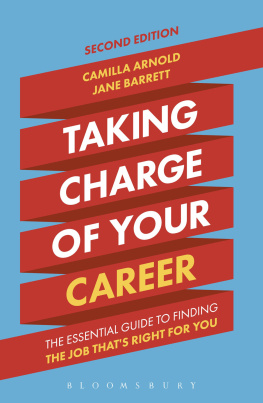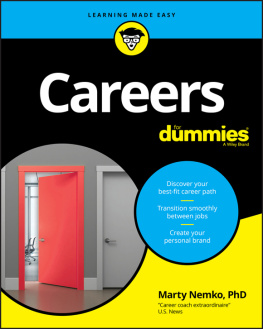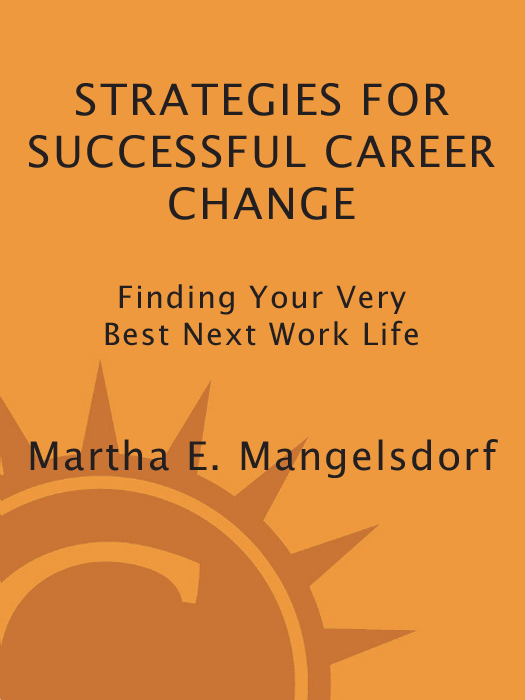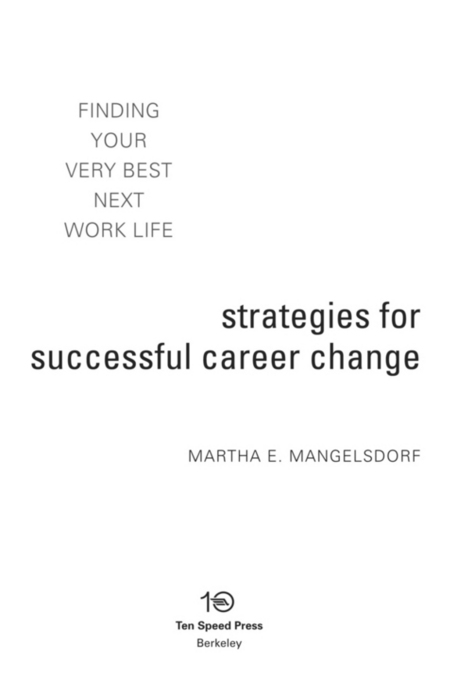Copyright 2009 by Martha E. Mangelsdorf
All rights reserved.
Published in the United States by Ten Speed Press, an imprint of the Crown
Publishing Group, a division of Random House, Inc., New York.
www.crownpublishing.com
www.tenspeed.com
Ten Speed Press and the Ten Speed Press colophon are registered trademarks of
Random House, Inc.
Library of Congress Cataloging-in-Publication Data
Mangelsdorf, Martha E.
Strategies for successful career change: finding your very best next work life /
Martha E. Mangelsdorf.
p. cm.
Summary: A practical guide to changing careers, including tips, exercises, and resources to help readers navigate the logistical, financial, and emotional challenges of career transitionProvided by publisher.
1. Career changesUnited States. 2. Vocational guidanceUnited States.
3. Job huntingUnited States. I. Title.
HF5384.M34 2009
650.140973dc22
2009002365
eISBN: 978-0-307-76854-4
v3.1
This book is dedicated to my wonderful husband,
Roy, the light of my life, and to Max, my beloved stepson.
It is also dedicated to my parents, Mary and Paul, who taught me
the great joy that comes from learning and gaining knowledge.
acknowledgments
Thanks to all the many career-changers who shared their stories and experiences so willingly with me, often in multiple interviews conducted over a period of years. Although not everyones story appears in the book, all were helpful and informative. Thanks, too, to all of the career-changers friends, family, and former colleagues who also allowed me to interview them during the course of the four years I wrote a newspaper series about career change.
Thank you to all the many talented and capable individuals at Ten Speed Press, for their skill, gifts, and hard work at all phases of the books production. In particular, I want to thank my editor, Brie Mazurek, whose insights have been terrific, skillful, and helpful; editorial director Aaron Wehner; copyeditor Kristi Hein; and designer Betsy Stromberg. Thanks also to my agent, Colleen Mohyde, for her excellent advice throughout this process.
I have worked with many great editors over the years, but I would particularly like to thank Steff Gelston. Steff, a senior editor at CXO Media, is a former assistant business editor of the Boston Globe newspaper, where she edited the papers Sunday careers section. Steff was the editor to whom I wrote my initial proposal for the Transitions series, and she was my editor for most of the time I wrote that freelance series for the Globe. I cant thank her enough for being such a great editor: open to new ideas, full of good feedback and perspectiveand kind and efficient, as well.
Special thanks also go to my brother, Paul Mangelsdorf III, and my sister-in-law Laurice, for their exceptional support. I am particularly blessed that Lauricea former financial aid counselorwas willing to volunteer her time to help me research complex financial aid issues as background material for the chapter on training. Thank you, Laurice.
Thanks to all the many people who have helped me at various stages in the process of conceiving and writing this book. In particular, I received very helpful advice or feedback early on from a number of successful book authors: Bo Burlingham, Donna Fenn, Jeffrey Seglin, and Lan Samantha Chang. Special thanks go to my friend and former boss Diane Franklin for her invaluable coaching. Thanks also to several people who were available at one point or another to do small freelance coaching, research, or filing projects related to the book: Jaffray Cuyler, for her excellent coaching during one phase of the writing; Amy E. Davidson, for her help in researching the Resources box in ; and Sierra Roseboro, for her help in setting up an article archive.
Thanks to the following people who served on a clearness committee (a Quaker process for helping individuals reach spiritual discernment about a life decision of some type) that I convened in 2007 to consider a question related to the book: Penny Yunuba, Margaret Benefiel, Patrick Gabridge, and Patricia Wild were all generous with their time and insights. Thanks also to my dear friend Judy Goldberger, who not only allowed me to add her story to this book but who has always offered encouragement and who has helped keep me spiritually grounded throughout this project. Thanks to Roy, my beloved husband, for his tremendous love and support throughout this challenging process. And thanks to my dear stepson, Max, for pushing me toward progress through that persistent question of his: Hows the book?
introduction
I saw that there is nothing better for a man
than to enjoy his work, because that is his lot.
Ecclesiastes 3:22
This is a book about finding work you enjoy. If youre thinking about changing careers but arent sure how to do it, this book is for you. If youve ever read or heard about people whove changed careers and wondered how they went about doing it, this book should help. Its a book about the how of career changeone that grew out of in-depth interviews with dozens of people who have successfully changed careers. Its about how to do research about a new career, how to test career possibilities in low-risk ways, and how to juggle money and family issues. Its about how to follow your dreams but still pay the bills. Whether you are seriously thinking about changing careers or just exploring the idea a little, Strategies for Successful Career Change can help.
However, if you dream of a perfect new careerone that will fulfill all your dreams for work and be without problems or drawbacksthis book may disappoint you. Work is seldom, if ever, perfect. And no career will be without problems or drawbacks. As I interviewed career-changers, it became abundantly clear that career change is hard work, often takes a long timeand is somewhat risky. Whats more, although finding more satisfying work can definitely improve your happiness and the quality of your life, changing careers is unlikely to make you happy if you tend to be a chronically unhappy person.
But if you are thinking realistically about changing careersand need down-to-earth, practical information about how real people do thatthis book is for you. In my talks with successful career-changers, I identified certain patterns and themes that were part of a number of peoples experiences. Although no one career-changer fits all the patterns, I could nonetheless see themes and best practices that emerged in various career-changers stories. Throughout this book Ill share their stories, with an emphasis on how they made the transition successfully.
why I wrote this book
My introduction to the art of career change came through my own experience of career transition. In my twenties and early thirties, I was truly blessed in my work. I had found work that really fit me at the time, and I loved it. (It wasnt perfect, but I think it was as close to perfect as work gets.) In college I had been torn between becoming an economist or a newspaper reporter; I had majored in economics yet also loved being a reporter and editor at my colleges daily paper. Ultimately, I blended both interests and became a business journalist. I soon landed, in my mid-twenties, as a reporter/researcher at


